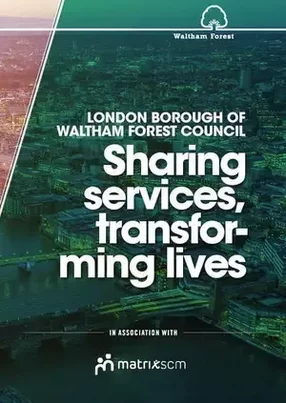London Borough of Waltham Forest: Creating value through supply chain innovation
Providing an array of services, from adult social care, housing, environmental and leisure services, education and vocational training, and more, London Borough of Waltham Forest supports more than a quarter of a million citizens in northeast London. Encompassing a multifarious portfolio, its procurement division has subsequently faced a number of challenges amidst a changing economic climate.
Moving from central to local government services, via a quango, Director of Supply Chain, Dave Levy, has been a key figure in the public sector procurement industry for more than two decades. With a passion for delivering effective public services through procurement and supplier relationships and adding value across its services, he has led the borough’s procurement service for nearly 10 years. Over the last two years his role has broadened to include contract management, business intelligence, insurance and risk, as well as its corporate complaints team.
“Procurement takes up the bulk of my time, but I also run a shared procurement service with another London borough, Redbridge. I have had to change the way that public sector procurement behaves,” he says.
“Procurement used to be very much focused on compliance, process, following regulations - those days are gone. Of course, that is still needed but the emphasis now is on people that have a bit of commercial know-how, can identify opportunities and deliver on those, influence service redesign and undertake more effective supply chain management.”
As public procurement moves away from process and towards attracting those with a range of skills, automation and new digital tools will further revolutionise the industry. Utilising electronic tendering and spend analytics more effectively will further impact the ways in which traditional services are delivered.
“When I joined procurement, it was very much around process and compliance. That has changed. Now it's about making sure we deliver the added value,” he adds.
“Making sure we deliver outcomes, that we deliver social value through our contracts and other essential policies. This includes paying the London living wage and eradicating modern slavery throughout the supply chain. That is why it’s important that that we've got people within the organisation that have the know-how to make this happen.”
Creating the first local authority shared procurement function in the Capital with the north London borough of Enfield in 2011, the council has taken all lessons learnt and applied the learning from that arrangement to develop its partnership with Redbridge. Whilst local authorities continue to struggle to recruit and retain talent, its shared service has enabled the two boroughs to look at its procurement activities and formulate joint arrangements to drive long-term advantages.
“We’ll look at economies of scale where possible in areas such as indirect spend but we can also learn from each borough. For example, in areas such as social care, where there may be examples where one borough has done something innovative or even something that's not quite worked and use that to inform solutions at the other borough. Sometimes the benefits of joint working are less obvious, but the simple efficiency benefits of doing something once, there's a potential financial benefit. There’s also a cost benefit in sharing experiences, learning and maximising efficiency.
“This is where I am most proud, delivering the shared service with Enfield and later with Redbridge. The transformation of procurement from a transactional back office function when I arrived to a strategic support service is testament to the ambitions of the authorities and also a credit to the staff who deliver on a day to day basis. We buy everything from paperclips to education, social care and new buildings. There aren't many jobs where you get involved in so many diverse areas.”
Managing all procurement activities for anything over the EU threshold, Levy’s team works in partnership with the client service areas to deliver contracts and supports all associated strategic supply chain relationships. Additionally, he developed the council’s Contract Management Framework, setting out key standards relating to contract reviews, risk management, issue management and planning.
“Most contracts are managed operationally by leads within service areas, so the client department will manage those contracts. If it's a strategic contract, if it’s one of our key partners, then we get involved from a commercial perspective,” he explains.
“We still have operational meetings and they'll manage the service and contract on a day-to-day basis but on the strategic side, we'll get involved to ensure that the overall objectives of that contract are met, that there is alignment at a strategic level between both parties and deal with any commercial issues that arise.”
The council is keen to driving continuous improvement and efficiency through technology. An example of this is their contract with Matrix.
“In terms of our innovative procurement methods and technology, Matrix is one of the council’s strategic suppliers, spending up to £20mn (US$26.1mn) per annum on agency staff. We have worked successfully with them for a number for years now, where they act as a neutral vendor and source our requirements from their supply chain. The source to pay process is fully electronic with CVs, timesheets and invoicing all handled within the system with appropriate financial approvals built into the workflow. As our needs have changed over time Matrix has worked in partnership with the council to develop a hybrid solution with tailored supply chains for different job types e.g. hard to fill areas,” says Levy.
Whilst all local authorities in London have adopted an electronic tendering system, the council has adopted a collaborative e-tendering system which undertakes all associated procurement activities.
“Whether you are after a quote for £10,000, or you're going after a multi-million-pound contract, it all goes through that system and ultimately published on our contracts register. It ensures transparency and allows potential suppliers to bid for contract opportunities across the Capital,” he adds.
“We have also implemented a number of Dynamic Purchasing Systems (DPS) using AdamHTT to enable a fully electronic, EU compliant, sourcing solutions for social care (homecare), special educational needs transport, temporary accommodation and most recently, Specialist Professional Services. This last category is an innovative approach to buying consultancy and covers 20 categories of professional services. It is also open to the wider public sector and provides a more effective alternative to procuring consultancy than traditional frameworks.”
In such a mature market, collaboration has, therefore, become vital to enable more effective sourcing of goods and services. 23 London boroughs have subsequently adopted the London Tender Portal, where suppliers can sign up, pick sectors of interest and will receive an alert when a local authority has an opportunity and bid for new prospects.
Bringing on board new digital tools has enabled the council to transform its spend analytics and further understand the markets in which it operates. Investing in digital product Atamis has allowed data to be explored fully to identify opportunities, where the council has looked closely at its categories and transform its supply chain management capabilities.
“For example, we could look at price differentials for the same product or service. We might have areas where we've not got much in the way of a local supply chain, and look at what we can do to help that. We use spend analytics an awful lot, but there’s a lot more that we can do with it,” he says.
“Public sector bodies have to publish spend of £250 plus a month, and there are companies out there that will do analysis from that. They take that data and send it back to you in a format which enables you to interrogate it. There are some advantages because you haven't got to do lots of data cleansing, although it’s not as rich as our own data, (it’s fairly high level) it does at least enable you to start asking questions.
See also:
- AEX Gold aims to invest in Greenland through its new gold mining project
- How Cotton On Group is tackling the African market with its trailblazing supply chain transformation
- How procurement is key for VLH and the hotels sector
“There's a lot more we can do with spend data through our business intelligence side, such as cross-matching service performance data, with spend and budget data. We can then explore for example, if we have a really high performing function What are we spending on that? What outcomes are being delivered? Is it underpinned by lots of contracts? I think this would be really valuable in the future in determining our ROI.
“We've been approaching this over the summer doing a proof of concept with Cloudwick and Amazon Web Services, using things like natural language processing and machine learning to identify the potential use of such tools to help us deliver services more effectively.”
Levy is eager to enhance capacity and capability across the organisations. Developing a training programme for staff, covering everything from the basics around process to sustainable procurement, social value and contract management, the tool encompasses the entire procurement cycle.
“Some elements of the training programme are integral. Without it, people can't do what they need to do, training on the e-tendering portal must be done in conjunction with contract procedure rules, so that staff not only understand what they have to do but more importantly why. The big push at the moment within the boroughs is around social value but it's no good if just comes from leads in procurement. We need this to be embedded in the design of services and contracts so I need to get senior buy-in from both boroughs, and elected Members to champion some of these causes,” he states.
Brexit is naturally a major issue at the moment and recently the Council has established a working group and held risk workshops to look at the potential impact and to enable scenario planning.
“There is no doubt that if freedom of movement becomes an issue it will impact our supply chain with regards access to labour. We've also got issues in London within social care and the construction sector”, he says.
“Medium to long-term, we will look at the pipeline of developments that are going to go on in the different boroughs and we can use this as an opportunity to attract and train apprentices to plug these gaps. Whilst it's going to be a turbulent period, we know we have to keep local services running and most services are underpinned by contracts and third parties in some way so ensuring that our suppliers are planning for Brexit is also key.”
Levy is passionate about the value that public sector procurement can add, and to ensure that the procurement function remains valued, Levy continually strives to ensure that the procurement team is viewed as a critical friend that delivers value for money across all services delivered in Waltham Forest. Creativity, delivering exceptional results and driving value will remain its key goals as it serves citizens now and, in the future, bringing new solutions to the table and enabling a new breed of procurement professional through digitisation.






- WATCH: Ivalua and PwC Navigate the Future of ProcurementProcurement
- Top 10: Women in Supply Chain and Procurement in APACProcurement
- Dumarey Streamlines Suppliers with BearingPoint and JAGGAERSupplier Relationship Management (SRM)
- P&SC LIVE New York welcomes Bob Bruning CPO at CBREProcurement

